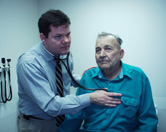UNMC researchers have begun the first clinical study in the United States to examine the safety and effectiveness of a unique new drug that may have potential in the treatment of acute myeloid leukemia (AML). AML, a cancer of the blood and bone marrow, is the most common type of acute leukemia in adults, with an estimated 10,000 new cases a year.
UNMC is conducting the first and second phase of a clinical study in adults, age 19 and over, whose treatment has failed or who are not eligible for conventional chemotherapy. Those who have not yet received any treatment for their disease also may be considered for the study.
The goal of the study is to evaluate how safe the drug is and how effective it is in inhibiting the growth of leukemia cells.
Participants will receive treatment at no extra cost on an outpatient basis in the Lied Transplant Center on the UNMC/NHS campus. Participants can be part of the study and continue to see their own physicians. They may refer themselves or be referred to UNMC by their physicians.
James Foran, M.D., principal investigator of the UNMC study, said the oral drug, whose name is currently confidential because of proprietary issues, is part of a new class of drugs called receptor tyrosine kinases (RTK) inhibitors, which appear to play an important role in the disease process. He said the drug might be a potential adjunct, or additional treatment, in what frequently is an incurable disease.
Leukemia cells in most patients express RTKs, or growth receptors, which cause leukemia cells to multiply when interacting with their respective growth factors.
“There is no standard therapy for those whose initial treatment has failed or are not eligible for conventional chemotherapy. Even with any successive standard therapy, prognosis is poor, with an average survival in the range of three months,” said Dr. Foran, an oncologist and assistant professor at UNMC.
“This is a new treatment approach to leukemia. Initial studies in healthy volunteers suggest that single doses of the drug are well-tolerated, and about a dozen patients in Europe and the United States are currently being treated with this medication for other cancer,” Dr. Foran said. “This is the first study in leukemia, and it is a very exciting opportunity at UNMC to improve our understanding of how leukemia cells survive, how we can bypass those survival mechanisms, and ultimately develop better treatments for this disease.”
The study is funded by Sugen Inc., now part of Pharmacia Corporation, a worldwide pharmaceutical company. Dr. Foran said UNMC was the first site chosen to test the drug in AML because of its cancer research and clinical programs.
Dr. Foran said studies like this enable researchers to learn more about the biology of the disease in order to design new treatments with better results and fewer side effects.
“There are major changes, astonishing developments in our approach to the treatment of cancer. This is due to research and the different way we are thinking about and targeting cancers specifically. The changes I-ve seen in 10 years are incredible,” he said.
“Drugs like this are changing the way we think about leukemia, and I believe will change the way we treat leukemia in the next few years,” Dr. Foran said. “We probably won’t get rid of chemotherapy because of its effectiveness, but drugs like these will be important additions to therapy.”
The Leukemia and Lymphoma Society estimates about 21,500 deaths in the United States in 2001 resulted from leukemia. Of that, about one-third (7,200) died from AML.
AML, a rapidly progressing disease that originates in a cell in the marrow, causes uncontrolled growth of developing marrow cells that affect the body’s ability to fight infections. Dr. Foran said about one in four patients under 60 years old with AML can be cured, but the disease in those 60 and over is much more difficult to cure.
AML is the most common form of acute leukemia and occurs mostly in people in their 60s, 70s and 80s. The cause is unknown in most cases.
UNMC/NHS is recognized internationally for its expertise in the diagnosis and treatment of leukemias and lymphomas and is one of the busiest bone marrow and stem cell transplant centers in the world. James O. Armitage, M.D., now dean of the UNMC College of Medicine, launched the program in 1982.
Other physicians working on the study are UNMC oncologists Phil Bierman, M.D., Gregory Bociek, M.D., Anne Kessinger, M.D., Steven Pavletic, M.D., Elizabeth Reed, M.D., Stefano Tarantolo, M.D. and Julie Vose, M.D.
For more information, call Maribeth Hohenstein at (402) 559-9053.
Photo cutline: James Foran, M.D., examines Ed Silver, a retired farmer from Ord, Neb. Silver was the first patient to enroll in the UNMC study.